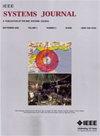Bi-Layer Decentralized Optimization Algorithm for Peer-to-Peer Energy Trading in Multimicrogrids
IF 4.4
3区 计算机科学
Q1 COMPUTER SCIENCE, INFORMATION SYSTEMS
引用次数: 0
Abstract
The growth of distributed renewable energy in microgrids (MGs) raises challenges in energy management and consumption. As an innovative approach, peer-to-peer (P2P) energy trading offers a promising solution to address these problems. In this article, we propose a bi-layer decentralized (BLD) optimization algorithm for P2P energy trading in multimicrogrids (MMG). Compared with traditional optimization algorithms that are single-layer decentralized (i.e., decentralizing solely at inter-MG trading and typically centralizing prosumers within the MG), the proposed algorithm achieves bi-layer decentralization (i.e., decentralization extends to both inter-MG and intra-MG trading). In this way, the BLD algorithm can significantly preserve the information privacy and decision independence of prosumers. In addition, the proposed algorithm can efficiently manage power flow in a decentralized manner at both layers, whereas existing decentralized algorithms frequently neglect this critical feature. Furthermore, an accelerated BLD (ABLD) algorithm is proposed to address time-consuming issues in this nested P2P trading for MMG. Numerical simulations on various test systems demonstrate the effectiveness of the proposed algorithm. The results indicate that the error of the proposed algorithm is below 0.1%. In addition, BLD requires 15602.03 s to converge with 560 prosumers, while ABLD only requires 228.05 s.多微电网点对点能源交易的双层分散优化算法
微电网中分布式可再生能源的增长提出了能源管理和消费方面的挑战。作为一种创新的方法,点对点(P2P)能源交易为解决这些问题提供了一个有希望的解决方案。在本文中,我们提出了一种用于多微电网(MMG) P2P能源交易的双层分散(BLD)优化算法。与传统的单层去中心化优化算法(即只在MG间交易中去中心化,通常在MG内集中产消者)相比,本文算法实现了双层去中心化(即去中心化扩展到MG间和MG内交易)。这样,BLD算法可以很好地保护产消者的信息隐私和决策独立性。此外,该算法可以有效地以分散的方式管理两层的潮流,而现有的分散算法往往忽略了这一关键特征。在此基础上,提出了一种加速BLD (ABLD)算法,解决了MMG嵌套P2P交易的耗时问题。在各种测试系统上的数值仿真验证了该算法的有效性。结果表明,该算法的误差在0.1%以下。此外,BLD需要15602.03秒才能收敛到560个产消者,而ABLD只需要228.05秒。
本文章由计算机程序翻译,如有差异,请以英文原文为准。
求助全文
约1分钟内获得全文
求助全文
来源期刊

IEEE Systems Journal
工程技术-电信学
CiteScore
9.80
自引率
6.80%
发文量
572
审稿时长
4.9 months
期刊介绍:
This publication provides a systems-level, focused forum for application-oriented manuscripts that address complex systems and system-of-systems of national and global significance. It intends to encourage and facilitate cooperation and interaction among IEEE Societies with systems-level and systems engineering interest, and to attract non-IEEE contributors and readers from around the globe. Our IEEE Systems Council job is to address issues in new ways that are not solvable in the domains of the existing IEEE or other societies or global organizations. These problems do not fit within traditional hierarchical boundaries. For example, disaster response such as that triggered by Hurricane Katrina, tsunamis, or current volcanic eruptions is not solvable by pure engineering solutions. We need to think about changing and enlarging the paradigm to include systems issues.
 求助内容:
求助内容: 应助结果提醒方式:
应助结果提醒方式:


